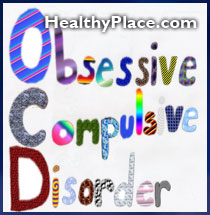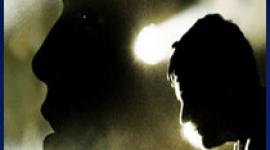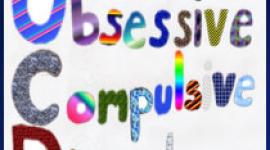Obsessive Compulsive Disorder

How to Help Patients with OCD
James Claiborn Ph. D. specializes in providing cognitive-behavioral therapy to adult OCD sufferers.
David Roberts is the HealthyPlace.com moderator.
The people in blue are audience members.
David: Good Evening. I'm David Roberts. I'm the moderator for tonight's conference. I want to welcome everyone to HealthyPlace.com. I hope everyone's day has gone well. The weekend is almost here :)
Our conference tonight is on "OCD: What Can Be Done To Help". Our guest is James Claiborn, Ph.D. Dr. Claiborn is a Ph.D. psychologist. Some of you may recognize Dr. Claiborn from the OCD (Obsessive-Compulsive Disorder) mail list where he responds to "ask-the-expert" questions. Dr. Claiborn is a member of the scientific advisory board of the Obsessive Compulsive Foundation. At his "day job" though, one of the things he does is provide cognitive-behavioral therapy to adult OCD sufferers.
Good Evening, Dr. Claiborn and welcome to HealthyPlace.com. We appreciate you being here tonight. Very briefly, because maybe we have some visitors tonight who are learning about Obsessive-Compulsive Disorder for the first time, what is it and how do you know if you have it?
Dr. Claiborn: OCD is well-named as it is a disorder where people have obsessions and/or compulsions. Obsessions are ideas thoughts, images, impulses, etc. that intruded into one's mind and that are upsetting. Compulsions are things people do often, over-and-over, in a stereotyped way to reduce their distress. The disorder is diagnosed if a person is suffering from these and it takes up significant time or causes interference with functioning in life.
David: What causes OCD?
Dr. Claiborn: We don't know the cause of OCD but there is reason to believe it is partly genetic. Some children may get it as a reaction to strep infections. We also know that it is not caused by bad toilet training, as Freud used to think.
David: You provide cognitive-behavioral therapy to help OCD sufferers. What is that? How does it work? And how effective is it in relieving the symptoms? (For those in the audience who need a more detailed explanation of Obsessive-Compulsive Disorder, visit our OCD community.)
Dr. Claiborn: Cognitive behavioral therapy, or CBT, is a treatment method that includes doing things like intentionally exposing a person to what they fear and stopping them from carrying out compulsions. It also includes methods like looking at errors or problems in thinking that lead to distress. CBT is as effective, or more effective, as a treatment for OCD, than medication. Most people who go through CBT will get a significant benefit in reduction of symptoms.
David: How important are medications in controlling the OCD symptoms and also in helping to be more receptive to therapy? Is it imperative for a person with OCD to be on medications?
Dr. Claiborn: On any given trial, about half of the people will get a benefit from medications, and if we look at trying several medications about 70% can benefit. However, some people believe that the reason medication helps is because it reduces anxiety and allows people to do the exposure-based things that really help.
If we look at someone with mild to moderate Obsessive-Compulsive Disorder, they may get as much help as they need from Cognitive Behavioral Therapy alone and never need to take medication. Some people will not do CBT until after they are on medication.
In either case, if they ever want to be off medications, they will need to do CBT. Experts on children recommend that all children with OCD get CBT and some get medications. I would say the same for adults.
David: Before we get to some audience questions, what about self-help for OCD? How effective would that be?
Dr. Claiborn: We have reason to believe that self-help methods can be very useful especially for mild to moderate OCD (Obsessive-Compulsive Disorder). There are several good OCD self help books and some good support groups.
David: Could you please mention one or two titles?
Dr. Claiborn: I often recommend Lee Baer's, Getting Control, or Hyman and Pedrick's The OCD Workbook. Also books by Steketee or Foa are very good.
David: I was also wondering if a person can ever make a full recovery from Obsessive-Compulsive Disorder, or whether it is a lifelong disorder that is constantly managed?
Dr. Claiborn: If we say that a person whose symptoms are so mild as to not be a problem is cured, then some people will get there. For most people with OCD, however, it is a chronic problem and needs to be managed.
David: Here are some audience questions, Dr. Claiborn:
AmyBeth: I believe my best friend suffers from Obsessive Compulsive Disorder. She never throws anything away. It is so bad now that she can hardly live in her apartment. She knows she needs to change but she can not seem to. How can I help her change without losing her as my friend because she gets mad at my suggestion?
Dr. Claiborn: Your friend has hoarding, a common problem in Obsessive Compulsive Disorder. This type of OCD is very hard to treat and it almost always requires a professional.
The professional, working with hoarding, will probably need to make home visits, which is not something most are willing to do. You can read up on hoarding and help your friend get rid of some stuff, but she has to be the one who decides what to get rid of and when.
tee: Is CBT effective in treating people that have mainly obsessions (intrusive thoughts)?
Dr. Claiborn: It used to be thought that CBT would not work well for people who did not have obvious compulsions. This is sometimes called "Pure O" for people who have only obsessions. The fact is that these people usually have mental rituals or other ways to reduce anxiety. The answer is yes, this type of OCD will respond to CBT as well as any form of OCD. This type is much harder to treat as a self-help project.
sherryann8: I am new with this. I have a mild case. Will I still need medicine for it? Will I get better even if I do not take any medications? Are there mild cases such as mine that will just go away?
Dr. Claiborn: Although sometimes, it may go away, I would not want to wait and see. Not everyone needs medication and in mild cases, often CBT will be enough help that OCD becomes what we call "sub-clinical," meaning it is not taking up much time or causing much distress.
sherryann8: My family thought I had this before I knew it myself. How is that?
Dr. Claiborn: Sometimes, we don't see what we do as a problem or we think it is reasonable. In OCD this can happen and others know there is a problem, but you might think it makes sense.
cwebster: I've read all the OCD self help books I can find, and belong to several self-help groups online. I take medications, but despite improvement, I still have difficulty getting rid of "stuff." Do you have any CBT suggestions for discarding things? Thanks!
Dr. Claiborn: If you mean that you hoard stuff, there are a couple of ideas. You could join a special email list of hoarders and get some support from them. You can read the professional research on hoarding. You can try to figure out what is so scary about getting rid of stuff and take some chances throwing out not-too-scary stuff first, and move up the list.
David: What are the most difficult types of OCD behaviors, besides hoarding, to deal with from a therapeutic standpoint?
Dr. Claiborn: Some people have what is called "overvalued ideas". They insist that their fears are realistic or their compulsions are needed. They will then refuse to do the cognitive behavioral therapy.
Dave1: What can you try after you have tried all the SSRI's, Anafranil, etc. with no success? Anything new on the horizon?
Dr. Claiborn: If you mean are there any new medications on the horizon? Not that I know of. If you have not tried Cognitive behavioral therapy however, that is well worth it.
David: For the audience, if you suffer from Obsessive Compulsive Disorder, please let me know what type of obsessions or compulsions you have, and if you have received treatment for OCD that works, what worked for you? I'll post the answers as we go along.
Dr. Claiborn, how long should one expect to go to therapy before they see a marked improvement in how they feel?
Dr. Claiborn: Cognitive behavioral therapy actually works fairly fast. In some settings, they do intensive treatment every day for a few weeks with very good results. In most settings, however, it is less intense but people should see some change within several weeks. With medication, it may take 10-12 weeks at a high dosage to get a good effect.
David: Here are some audience responses to my question. Maybe we can help each other here:
cwebster: I've had OCD since childhood. I used to "order" and "clean," but now "hoard" nearly everything (clothes, books, paper bags, etc); I also count mentally, check things over-and-over, hum songs over-and-over in my head, ruminate and ask for reassurance, and "collect" living things and worry about harming them (e.g., frogs). CBT and Effexor-XR have helped (although, I've a long ways to go, especially with the hoarding).
lorreleon: Obsessions, compulsions- checking/reassurance, intrusive thoughts: It helps noticing they are OCD thoughts and working on not asking for reassurance.
tee: I know that my ocd fears are silly, but when I am in the moment, it seems so real, like all those fears are possible.
SarahKatz: I do not have OCD but my husband does. He has gotten some relief from Prozac.
rwilky: Is shyness or timidity included in OCD? Is it easily treated with CBT?
Dr. Claiborn: Shyness to the extent that it causes problems is more likely to be a social phobia. This also responds to CBT but the treatment is a little different.
David: Here's the link to the HealthyPlace.com OCD Community. You can click on this link and sign up for the mail list at the top of the page so you can keep up with events like this.
pahillsburtner: Dr. Claiborn, can hoarding be effectively managed without the professional coming to the home?
Dr. Claiborn: Most people with a hoarding problem will not be able to manage it without some professional help. From what we have seen, medication will usually not be a big help. If the professional can't come to the house, sometimes a friend can help. Usually, families are in such conflict with the hoarder, that their attempts to help don't work.
thinman99: What do you know about treating Down Syndrome people with OCD? My son has developed this during his transition from home to the workplace. He seems very anxious and all he wants to do is stay home. It is hard for him to express his feelings because of his retardation but he is a high to moderate functioning Down's young adult.
Dr. Claiborn: I have not worked with this population very much but I would think that in many ways the same sort of adjustment we make to treat children would work for a Down's syndrome adult. You could look at March and Mulle's book, OCD in Children and Adolescents : A Cognitive-Behavioral Treatment Manual, for a start.
SarahKatz: My husband has a fairly severe form of OCD. The psychiatrist that has been treating him is retiring. What suggestion do you have for selecting a new doctor? It took me years to get him to agree to any treatment. He still refuses CBT but the Prozac he takes does help.
Dr. Claiborn: Most psychiatrists these days know enough about OCD to manage the medications. You may be able to find a specialist by contacting the Obsessive Compulsion Foundation and asking for a referral list for your area. You can also get him some information about CBT and he may be willing to try.
chat: Do you have any recommendations for finding a good therapist who treats OCD?
Dr. Claiborn: I could start with the Obsessive Compulsive Foundation as they have a list of people who treat OCD. There are other professional organizations to try as well, such as the association for advancement of behavior therapy. I also recommend asking lots of questions before committing to treatment. The therapist should mention things like exposure and ritual (response) prevention or CBT. If they don't ask, or if they say they want to do something else, keep moving.
Rypax: Dr. Claiborn, I have an Obsession that I want to molest my daughter. I know that this is common and I am doing better with it, but how do I get over the feeling that I want to do this?
Dr. Claiborn: If it is a typical obsession, the idea seems horrible to you. You want it to go away. You think it means something awful that it comes to mind. The efforts to keep it out of your mind are part of the problem. Accept that this and other strange ideas come into everyone's head. There is nothing strange about having the idea. Do allow it to pass thru your mind and do not do anything to prevent it from happening, like leave the room, pray, ask for reassurance, or whatever. The final effect is that your obsession loses its power.
David: You mentioned earlier that genetics may have something to do with OCD. Does OCD seem to run in families and can it be passed on from parent to child?
Dr. Claiborn: The observation is that it does run in families, and that if a parent has it, the odds of their child having it are somewhat higher than in the general population. However, not so high that it is a sure thing. The genetics is one area that is being studied these days.
Dave1: Are there any special schools (even boarding) that handle teens with OCD?
Dr. Claiborn: I don't know of special schools and under most circumstances this would not be needed. If a teen has severe OCD, I would recommend a trial of intensive treatment and probably medication. Then, they can go back to school at their regular school with some special help.
David:Are there a lot of people with OCD who self-medicate, meaning taking alcohol or drugs to relieve their symptoms?
Dr. Claiborn: It is likely that in both teens and adults, alcohol and drugs are used as self-medication. It is hard to know until you get them substance free. We know that panic disorder is associated with high rates of substance abuse as a self-medication, and OCD may be similar.
luvwinky: Can you tell me anything about Tofranil (Imipramine)? My psychiatrist wants to try this medication on me.
Dr. Claiborn: Tofranil is a tricyclic antidepressant. It is a fine antidepressant, but I would not expect it to do anything for OCD.
David: Here's an audience comment:
tristatlc: To Dave1, there is a home of some sort in Michigan or Minnesota that is like a boarding school. I saw it on TV.
gorm: Is it better for a nine-year-old with Obsessive Compulsive Personality Disorder (emotional and cognitive rigidity and perfectionism) to go to a very structured school (somewhat rigid itself) or a more nurturing, gentle and less structured school?
Dr. Claiborn: First, let me say that Obsessive Compulsive Disorder and Obsessive Compulsive Personality Disorder are very different disorders. I would be somewhat skeptical about the diagnosis in a nine-year-old. We don't have much data on OCPD treatment but I would lean toward the less structured environment.
lprehn: What's the difference between obsessive compulsive disorder and obsessive compulsive personality disorder? Is it always a clear diagnosis for ocd, or is there a gray area?
Dr. Claiborn: OCD is defined as having obsessions and/or compulsions. OCPD is a personality disorder, which means we are talking about lifelong traits. They include rigidity, concern with rules to the extent that the point of the activity is lost, stinginess and more. If a person has obsessions or compulsions, think OCD. If not, then they don't have OCD. To me, it is not much of a gray area. It is possible to have both disorders.
David: Can you give us an example of how you might treat an obsession, let's say hand washing or constantly checking the oven to see if it's on?
Dr. Claiborn: Hand washing or checking are compulsions. An obsession is the fear that you have germs on your hand and will make your children sick, or the oven is on and you will burn the house down. To treat this, I might have the washer touch some things he/she thinks are "dirty" and get them to spread the germs around and not wash. This would make them afraid at first, but then the fear fades.
David: I know it's getting late. I want to thank Dr. Claiborn for being our guest tonight and answering questions. And I want to thank everyone in the audience for participating. I hope you found it helpful. If you haven't visited the rest of HealthyPlace.com yet, we have over 10,000 pages of content, so I invite you to take a look around.
Dr. Claiborn: Good night all.
David: Thank you again Dr. Claiborn and I hope everyone has a good evening and a good weekend. Good night everyone.
Disclaimer: We are not recommending or endorsing any of the suggestions of our guest. In fact, we strongly encourage you to talk over any therapies, remedies or suggestions with your doctor BEFORE you implement them or make any changes in your treatment.
APA Reference
Gluck, S.
(2007, February 24). Obsessive Compulsive Disorder, HealthyPlace. Retrieved
on 2026, February 27 from https://www.healthyplace.com/anxiety-panic/transcripts/obsessive-compulsive-disorder



